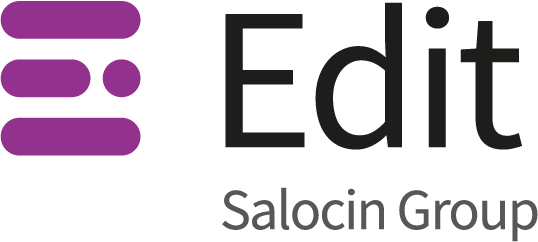Students face many challenges with higher education, and they don’t end once their place on their desired course has been confirmed.
The journey a student takes during their first few weeks of a course is one of the most important they will take in their lifetime, as they adjust to a different environment, new ways of learning, and a greater sense of independence.
To help students overcome these challenges, one UK university came to data strategy consulting firm Edit with policies to drive ambitions for a new student experience to support students in this initial phase and beyond.
The plan to improve retention
To overcome the difficulties faced by students, the university decided to roll out a five-year plan with ambitious targets to drive up participation and access, whilst also closing attainment gaps for their most deprived student demographic.
In addition, a flagship initiative in their 2030 strategy was created with the aim to develop and deliver a state of the art digitally enabled student engagement.
This initiative aims to create an integrated and intelligent student support environment that uses Artificial Intelligence (AI), machine learning, and nudge technology to identify behaviours and the specific support needs of individual students. Through this, they want to target interventions that will act to secure wellbeing and continual development and progression.
The project spans across every part of the university, so the team were facing many challenges to get this off the ground. It’s a good job that here at Edit we love a challenge!
5 key challenges faced
1. Data
- Readiness of existing data to support the ambition
- Lots of data held in many different places
- Complex and complicated data landscape understanding the relevance and quality of all the data sources (large data landscape)
2. Systems
- Existing technical systems (30+ identified as potentially useful for this project)
- Connectivity challenges
- Data dictionaries (partial/incomplete)
- Not a fully rounded understanding of what data exists
3. Research
- Improving and being able to measure student success in attainment, progression, and retention
- Ability to research the effectiveness of digital interventions on student engagement and ultimately success
- Proving that interventions work or not – stop doing what doesn’t work and only do what does
4. Expectations
- Multiple stakeholders with their own expectations from the top, down and everyone in between – needing to manage their expectations
- Need for a solution now
5. Reporting
- Willingness to move from a reactive/descriptive to prescriptive analysis
- Terminologies – inconsistent across all areas of the university
- Organisational capabilities (structure, teams, skills)
How does the work with Edit fit into a wider programme?
The project so far has introduced a foundation of technical infrastructure and will provide a baseline to allow decisions to be made about next steps such as additional data sources to further enhance the product based on feedback, evaluation, and research.
It has allowed us to unify core data sets along with Welcome Week engagement data to give the project a strong starting point to gain insight quickly.
As such, the university can now gain early insight into student engagement at a key time in the academic calendar and take the necessary steps to intervene, potentially impacting positively on student retention.
We can also develop and enhance digital innovations designed to continually support students while helping staff use business intelligence information to improve practice across the range of curricula and student service activities.
And that’s not all: by using Power BI, a familiar and existing platform used by the university, the data will be enhanced by unification and insight analysis that will allow staff to proactively intervene to support students.
Edit’s unique approach
The university has many highly intelligent, motivated people that can confront and solve problems as they come up, but unfortunately, they were acting within the confines of siloed departments.
The challenges that the university faced were not unusual to us. In fact, as a data strategy consulting firm, we were more than familiar with these issues as many of our private-sector clients faced them too. To overcome this hurdle, Edit applied similar methodologies which have been tried and tested successfully.
Together with the stakeholders from across the university, through workshops we helped them to create a unified strategic vision, so that we could then focus on a tactical priority to align all departments to be able to start work, and so that we could start delivering results.
Strategic Vision
Enhance this university’s position as the ‘Connected University’ by delivering sector- leading digital interventions, personalised to each student based on data-driven insight, which reduce continuation rate gaps, increase participation, and increase progression.
Tactical Priority
Understand the experience of the September 2021 intake using readily available data to quantifiably demonstrate potential impact of the strategic vision.
Edit’s solution
Once we understood the tactical priority and the opportunity from previous data, we could get started on filling the data gaps. For example, by using the attendance scanners we could plug the gaps where data was missing.
Our solution also utilised the Microsoft Dynamics 365 marketing platform. By designing an intervention strategy powered by data driven insight from Microsoft Dynamics 365 Customer Insights, we created the most appropriate technical solution. We were also able to build a strategy to address any gaps in skills or organisational capability which could cause the tech investment to deliver sub-optimal returns.
Use case example: Tom’s journey
Meet Tom, an example of the type of student who might face extra challenges during Welcome Week.
The entire process can be powered using the student’s own data, and behavioural predictions can be made using AI to prevent pain points and dropouts before they happen.
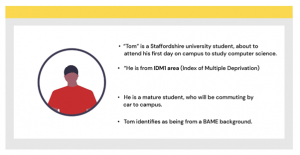
Here is an example of some of the challenges that Tom may face:
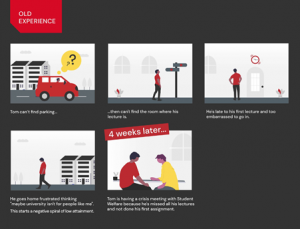
Interventions or support during or before any of these struggles would have gone a long way to preventing the issues Tom was facing.
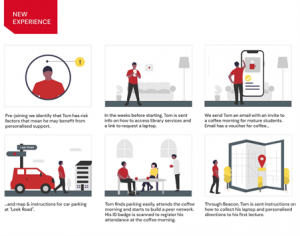
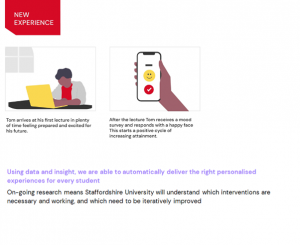
We can see that by using data to predict pain points before they happen, solutions and support can be put in place to achieve a successful start to Tom’s higher education.
In conclusion
We’re incredibly proud of what we have achieved with our partnership with this university and the learning experience Edit has had will go on to help thousands of students in one university alone.
If you think your higher education institution would benefit from a consultation to assess your data, marketing, or technology challenges we’d love to hear from you. Contact us here to learn more about how our expert team can help.
